7/26/2012
Act Like You Own It
Chris Beytes
Let’s be clear right from the get-go: This is not a story about Gary Mangum. He specifically told us he doesn’t want it to be about him. Anyway, there have been enough stories written about Gary to fill several magazines.
Yes, Gary is something of a genius when it comes to building relationships with customers. He is at the top of the game of vendor-managed inventory. He’s also a motivational guru on the level of a … well, offhand, we can’t think of anyone famous who engenders more staff loyalty than Gary. Says Bell Regional Market Manager Brian Harrison, “I’ve never worked for anybody who’s so attuned to the importance of the person.” Bell Nursery employees “bleed purple” (the corporate color).
It could be a story about Gary because he’s back at the helm of Bell after a 12-month period—“the break” as some Bell folks call it—where he backed away from day-to-day operations (it was NOT retirement, despite what some onlookers may have thought or implied). You may recall a couple years ago that a new CEO took charge of Bell; plus Gary promoted Adam Stewart to executive vice president to manage Bell’s relationship with Home Depot. Having these executives on board allowed Gary to step back and do less day-to-day stuff and more big-picture projects.
Long story short (and with the details off the record), the hires didn’t work out and both have resigned, the CEO last summer and Adam Stewart in June. Gary sums up the CEO departure simply: “At some point, he got too focused on inventory control. That’s really what led to us needing to go a different way. He was focused on profitability, which was clearly important, but we were moving too fast without consensus or customer buy-in.” Regardless of the reason, Gary is squarely back in charge as President and CEO.
Staff at both Home Depot and Bell greeted Gary’s return with rejoicing and even a few tears of joy. Gary is quick to credit Bell’s outside investment with numerous positive changes, including a new inventory system called “the Rainbow” and a new distribution center and offices, which have allowed Bell to be more efficient and better positioned for the future. But there’s no denying that Gary’s management style was sorely missed.
But like we said, this story isn’t about Gary. It’s about some of the other people who make up Bell Nursery, the distribution experts, the merchandisers and store supervisors, Kevin and Mavis and Heather and more … even Coach Andy (yes, a real, live sports coach).
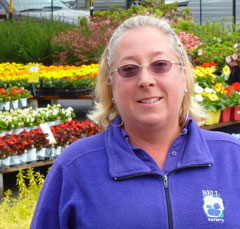
District Manager
Alison Anderson started with Bell in 2002 as a merchandiser at the Owens Mill Home Depot. A decade later, she’s in charge of nine stores. But Owens Mill is still “her baby.” That shows the level of ownership Bell’s merchandising team has.
Alison was the first of many folks we met who spoke with praise about Home Depot’s commitment to livegoods, clearing up the misconception that the DIY retailer might decide to drop plants at any time in favor of something less perishable.
“All I have to do is send them an email and boy, I get help,” she says. “I can have five Home Depot people out here on a Saturday just consolidating the cart corral.” Store manager Justin Irwin concurred, adding that he schedules four Home Depot employees just to water plants. And he makes sure the gates are open by 7 a.m. each day, eliminating another pet peeve of customers: locked gates.
Alison also explained the meaning of “grand-opening ready”—the standard Bell wants to achieve at every store, every day at 7 a.m.
“Grand-opening ready is a presentation where your customers would walk in and always want to come back. It’s making it the best it can be for the customer … . It’s keeping all the varieties available for every customer at every store, so they don’t have to go anywhere else.”
We asked if that wasn’t a bit frustrating to maintain, with customers constantly messing up the perfect tables.
“That’s a good problem,” she answered. “I’m okay with that. There’s a difference between neglected and shopped, a huge difference.”
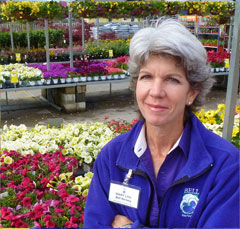
After a stint in the restaurant business,
Mary Lou Stransky loved the idea of working a couple of months in spring, outside, so she had time with her kids. It sounded like the perfect job, and was. Today, she’s a District Manager, with eight stores and 30 to 40 merchandisers total. We met at the Timonium store, where we asked what her biggest challenge is.
“Finding really great people who have the same passion we have: to work hard, be out here feeling that springtime rush, getting everything filled,” she answered quickly.
She admits she hasn’t figured out a sure-fire way to find or vet candidates, but one key she looks for is called the walk test. “If they can keep up with me when I’m walking, it’s probably a good sign.”
Then we asked about the mood in the field when Gary had backed away.
“Um … ” (she takes a long, thoughtful pause), “[Gary] is really great at sending out motivational emails, you know, when we’re out here, it’s hot, we’re working really hard, he’s really good at saying ‘Thanks for all the hard work, you’re doing a great job, hang in there’ … you know, being our cheerleader. I missed that part.”
In addition, she says reduced inventory was “a sore point” the previous summer when someone else was making decisions.
“I think one of the lessons everyone learned was that you need somebody [in charge] who understands the business. They put in good systems, and it was all needed, but you also need somebody who can say ‘Hey, we need fresh product, we need to fill up some places.’” She says that Gary returned to work on Monday, and by Friday her stores were back to grand-opening ready inventory levels.
“That’s what I mean when I say you need to have somebody who can react quickly.”
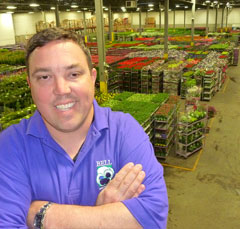
Other than Gary and Mike McCarthy (who IS retired),
Kevin Titherington is the longest-tenured Bell employee, having started in 1991, before the modern Bell Nursery was even born. Today, he’s distribution manager, responsible for Bell’s new distribution center in Elkridge, Maryland. The 20-door leased warehouse was one of the former CEO’s positive legacies, Kevin says. He and Mike used to talk about moving from the old five-door greenhouse dock in Burtonsville, but they could never pull the trigger and make it happen. (The new space includes
new management offices, too.)
“The biggest advantage here is the space, and having everything under one roof,” Kevin says. Annuals turn in 24 hours or less to the 62 stores they serve (another distribution center in Newark, Delaware, serves Bell’s 35 stores in Philadelphia and Delaware; Ohio’s 34 stores are served from Bell’s Ulery location; and 47 stores in southern Virginia and North Carolina are served by Bell’s Richmond, Virginia, location).
As a Bell veteran, Kevin saw good come from Gary’s “break”—such as building the distribution center he now runs. But the mood inside the company suffered. >>>
“There was a different feel,” he says. “I was always just as motivated and proud of what was going on, I think because I’ve been doing it for so long that it’s hard to take that out of me. But there were people who might have been a little disgruntled or wondered ‘What happened to the old Bell? It’s not the way it used to be.’ You definitely felt that.”
And when he learned Gary was returning?
“It was one of the most exciting things that I thought could happen to Bell. I think there was a rejuvenation, even before he came back.”
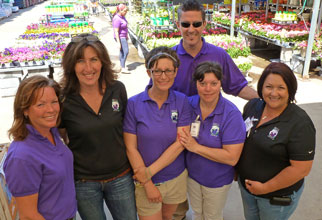
Philly is where we met Deb Liberato and Jennifer Steere, two district managers with 12 stores each, and JB Trimp, a merchandising execution team (MET) leader*.
Bell’s Philadelphia leadership team. Left to right: Helen McAndrews, Janet Finsen, Lyndsey Slanec, JB Trimp, Deb Liberato and Jennifer Steere
We spent a bit of time talking about hiring good merchandisers (find their tips in this month’s Acres & Acres column on page 82), but then the discussion came around to the mood in the field under the hired management. There was another one of those thoughtful silences, indicating that they were reluctant to say anything negative about Bell, even about a challenging time in the company’s history. JB was the first to speak.
“I think the human aspect of the company went away,” he said. “This is a total relationship business. These guys (Deb and Jennifer) are in communication with [Home Depot] DMs and store managers by phone or in person or whatever it is … that part of it, I don’t think the CEO was seeing. He saw numbers. He brought in a lot of fantastic systems, the tracking, the allocation, so now, the product flow is amazing … .”
“There was a lot of focus on units,” Deb explained. “How many units of a tropical we would sell in a two-week timeframe was all we wanted to have in the stores. So we were dealing with store managers and district managers who were asking ‘Where’s my product?”
And when they heard Gary was coming back?
“When Gary was fully here, motivation was always really good,” JB says. “Then it started to go down a little bit, and then a little bit more. When Gary came back and made more changes than he ever had, the motivation went from a good place to outstanding.”
“We’re in a perfect balance now,” Jennifer says. “Even if the numbers say you’ve got enough, if we’re standing there saying ‘But I really don’t,’ we get more.”
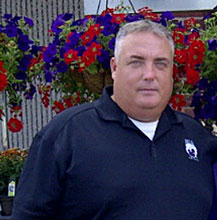 Andy Moore
Andy Moore is a teacher-turned-baseball-and-football-coach, whom Gary met through the Potter Baseball Tour, a traveling youth team Gary’s son Chase was on. The Potter Tour takes average young athletes and teaches character, sportsmanship and citizenship. In the process, these average kids combine into a formidable foe for the local teams they play against.
Gary was so impressed by the lessons the kids were learning and the teamwork that resulted that he asked Coach to come do the same thing for Bell. Although Gary’s instructions to Coach were somewhat vague: “It’s going to be your job. Figure it out. I just know you can help us.”
The first goal they came up with: Improve the return rate among seasonal employees (currently 40%), to reduce the number of new hires and the accompanying learning period. Coach’s other goal is to help all employees deal with conflict resolution and other common workplace frustrations. He does it all without H.R. training or motivational mumbo-jumbo.
“When you’re dealing with people and their emotions and motivations, I think you have to take the stuff from the books and put it aside,” Coach says. “You have to roll up your sleeves and get next to them.”
We had to ask: Isn’t it a big leap going from young men playing baseball to adults, mainly female, aged 18 to 73, with lots of opinions and life experience?
“A 15-year-old baseball player has parents I have to deal with,” Coach answers with a smile. “I’m pretty much not seeing anything I haven’t seen or heard already.”
He continues: “What I’ve seen since October is that Bell has some very passionate people. If you take passionate people, whether it’s little league kids playing baseball, Boy Scouts, chess players or whatever, they’re giving you all their energy. You just need to find ways to tweak it and get it going where you want it to go. It’s tough if you’re dealing with people without passion. But this is like a hobby to them. I call it their sandbox. You go into each store, it’s their sandbox.”
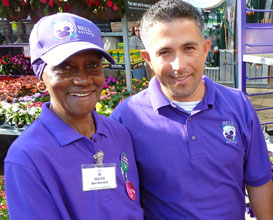 Mavis Benton
Mavis Benton holds one of the new Bell positions: Store Supervisor. It dedicates a full-time Bell person to each store, overseeing the seasonal merchandisers, maintaining a solid relationship with the Depot staff and executing Home Depot and Bell initiatives … basically taking ownership of everything going on in the garden center—truly, Acting Like They Own It.
Mavis Benton with MET leader Eddie Diaz
At 73, Mavis is a self-proclaimed workaholic with the energy of a teenager and the constant smile of a woman who loves life and loves her job (an added joy is helping put her grandkids through college, she says). A native of Honduras and a retired accountant, Mavis began at Bell as a part-time merchandiser (she had an in with the boss: she was nanny to Gary’s sons Chase and Kyle).
But shouldn’t a 73-year-old be on the front porch enjoying life rather than schlepping trays in the hot sun?
“I love doing it,” Mavis says. “I love dealing with people. And these flowers … jeez! When I come in here they just make my day, you know?”
Mavis has one weakness: inconsiderate customers who abuse or even steal the plants. She takes that very personally. Enter Coach Andy, who suggested that Mavis just walk away from the situation and take a “time out” in her car for 10 minutes (yes, a time out for a 73-year-old grandmother!) But it works, and today Mavis is much less stressed.
“You’re never too old to learn,” she says. “Life is an experience, and everyday you learn something different.”
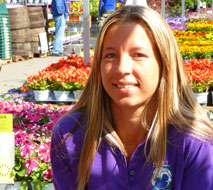 Heather Mangum
Heather Mangum
Yes, you recognize the last name. Like most kids in a family business, 29-year-old Heather has worked on and off for Bell. Trained as a teacher, she has decided (at least for the time being) to “stick with what I know.” To that end, she’s now Store Supervisor at Bell’s No. 1 Home Depot, Aspen Hill. No pressure, eh, being the boss’s daughter AND being responsible for the highest-volume store?
She laughs. “There’s a lot of pressure on me to set an example for other stores—how we run things here. We have a great merchandising team and they all work so hard, they all take ownership. We’re just trying to be the best.”
Heather oversees 10 merchandisers who unload two to four trucks of plants a day (42 to 84 carts), working 6 a.m. to 7 p.m. Heather obviously has the Mangum DNA: “I work very well under pressure. I think that’s what I excel in. I don’t like sitting in an office, I like being on the ground, working in the stores.”
As a female shopper herself, Heather is naturally attuned to her customers. We asked what they’re looking for.
“Anything with color. Anything that flowers. Our apron is where we display most of the eye-popping products women love, like geraniums and verbena.”
Since she knows Gary better than the average Bell employee, we asked Heather what it is that makes her dad so good at what he does.
“More than anything, his employees love showing off a table and getting positive feedback, and he offers that to them,” she replies. “That motivates them, because he’s coming in, he’s patting them on the back, surprising them with little gifts and rewards … He’s an amazing boss.”
And what about her long-term future in the family business? “I’m working hard to learn everything I can and add value every day,” she says. “I hope my results pave the way for personal growth.
“I love my dad’s mantra, ‘Act Like You Own It.’ I like to think I’m owner in training, maybe.”
GT